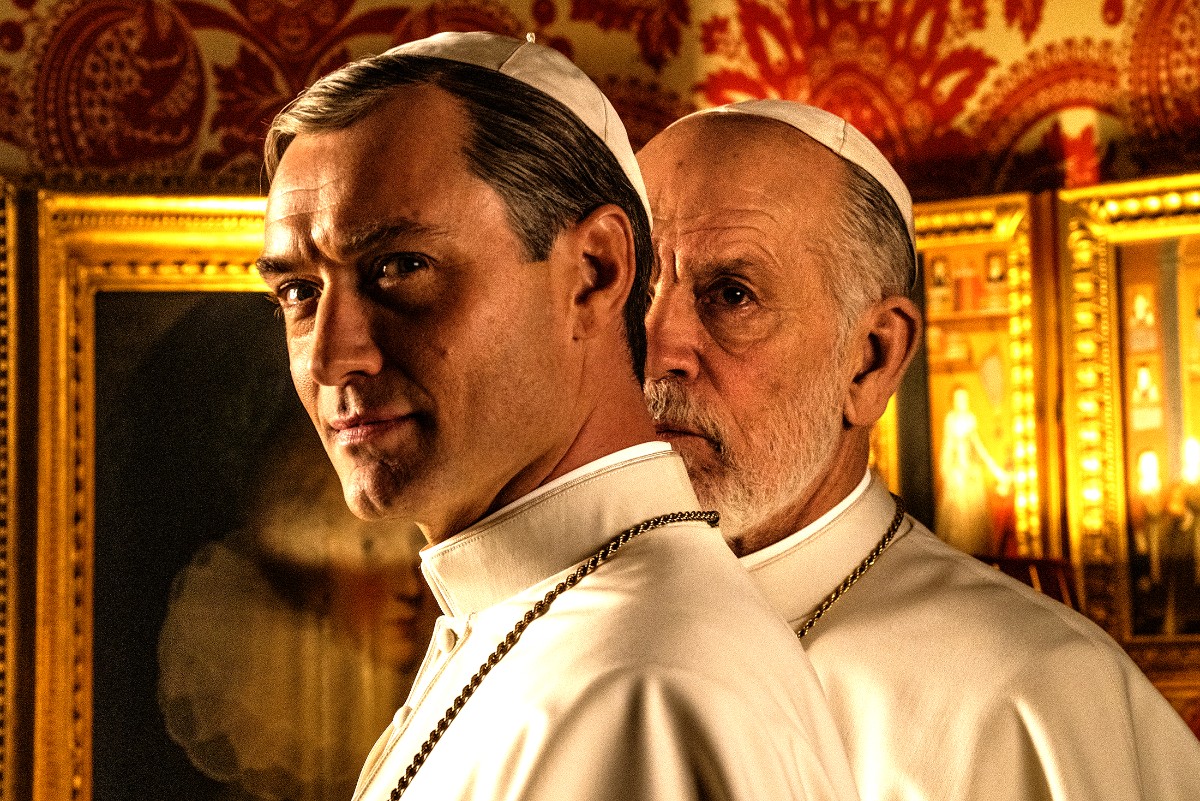If you’ve seen his Oscar-winning “The Great Beauty” or last year’s “Loro,” you’ll already be aware of Paolo Sorrentino’s directorial MO: he’s a stylistic auteur who readily embraces the ornate, the flamboyant, and the glamorous. Unlike others of his ilk, though – your Nicholas Winding Refns, your Gaspar Noés, your Tom Fords – it’ll be a rare day when Sorrentino’s aesthetic sensibility comes at the expense of his storytelling aptitude. Arguably, the Sorrentino’s recent television series, “The Young Pope,” represented a rare misstep in this manner: while the show was unanimously praised for its looks, there was much skepticism levied towards its oft-confusing plot.
From the footage (episodes 2 and 7 with a montage of key moments from those in between) I was able to view at Venice Film Festival this morning, “The New Pope” – a direct sequel series to “The Young Pope,” featuring a returning Jude Law as Pope Pius XIII, picking up eight months after the eponymous Pope’s climactic heart attack – represents a dazzling return to Sorrentino’s expected form.
READ MORE: 15 Must-See Movies At The 2019 Venice Film Festival
Part political thriller, part a “First Reformed“-esque narrative of shaken faith, “The New Pope” introduces a Vatican disrupted by the loss of two Popes in quick progression: Pius XIII is on the brink of death in a coma from which he is not expected to wake; his successor, Francis II, has been murdered by the Vatican’s shady upper echelon, punishment for his well-intended move to re-distribute the Vatican’s vast riches to the poor. In the process of finding a third Pope in a little under a year, sights are pointed towards John Brannox (a very welcome John Malkovich, who is incredible throughout) the flamboyant English aristocrat and author of “The Middle Way” – a manifesto advocating for a more centrist, palatable approach than that of Francis II.
As you might expect from the man who spent two-hundred-odd minutes ripping into Silvio Berlusconi’s web of corruption, Sorrentino’s vision of the Vatican is far from one of Judeo-Christian philanthropy. When Cardinal Voiello (Silvio Orlando) tries to justify the murder of Francis II as a move to protect the Church – “We are under siege,” he laments to his cold-footed colleagues – his words are tinged with thinly veiled self-servitude. This brand of narcissistic hedonism isn’t restricted to the Vatican’s higher-ups, either. In the cold open for Episode 2, a group of young priests stroke their crosses to the sight of Cécile de France’s Sofia, who teases the repressed boys with glimpses of her cleavage. The moral is clear: even for men of the cloth who vow celibacy, desire trumps faith.
While the behind-the-curtain look at the Vatican’s inner machinations is more than intriguing – the stakes are made high enough that I didn’t fall asleep to an episode ostensibly constructed of exposition-laced conversations – the show really kicks into high-gear with its focus returned to Pius XIII. Episode 7’s cold open constitutes one of the favorite moments I’ve had at Venice so far: A dream sequence sees a speedos-clad Pius XIII walk along a beach to a triumphant remix of Hendrix’s ‘All Along the Watch Tower,’ flanked by bikini-clad women, the color saturation bumped up to a heavenly pop. The angle is clear – this isn’t the miraculous return of a Pope; this is the apparent birth of a Messiah. A hot one.
With the rest of the episode comes the clear key conceit of “The New Pope” – a humanist interrogation of shaken faith. To the few who know of Pius XIII’s condition (his awakening is hidden from the public; he hides with his doctor in Venice), his resurrection is considered a marvel. Compounded by a well-publicized religious experience in his youth, it seems to point in the direction of the Second Coming. But he vehemently denies this as nothing more than luck: “I do not perform miracles,” he states, “I simply find myself in the center of coincidences.”
And therein lies what makes “The New Pope” so fascinating: it’s more than just a secular, skeptical take on sectarianism. It’d be easy, after all, to vacuously take down an institution so vehemently corrupt as the Vatican. What Sorrentino does here is interrogate core aspects of the human condition – death, grief, loneliness, suffering, sex – through a lens of religiosity. Ultimately, it’s excellent. [A-]





